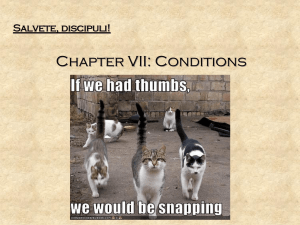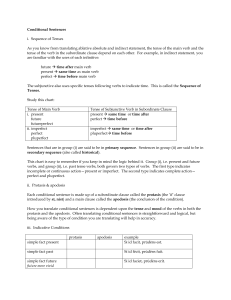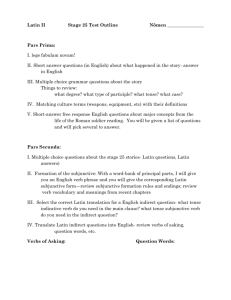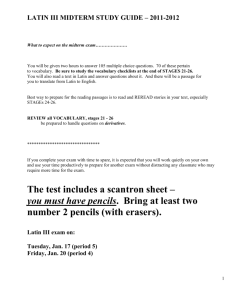Conditional Sentences
advertisement
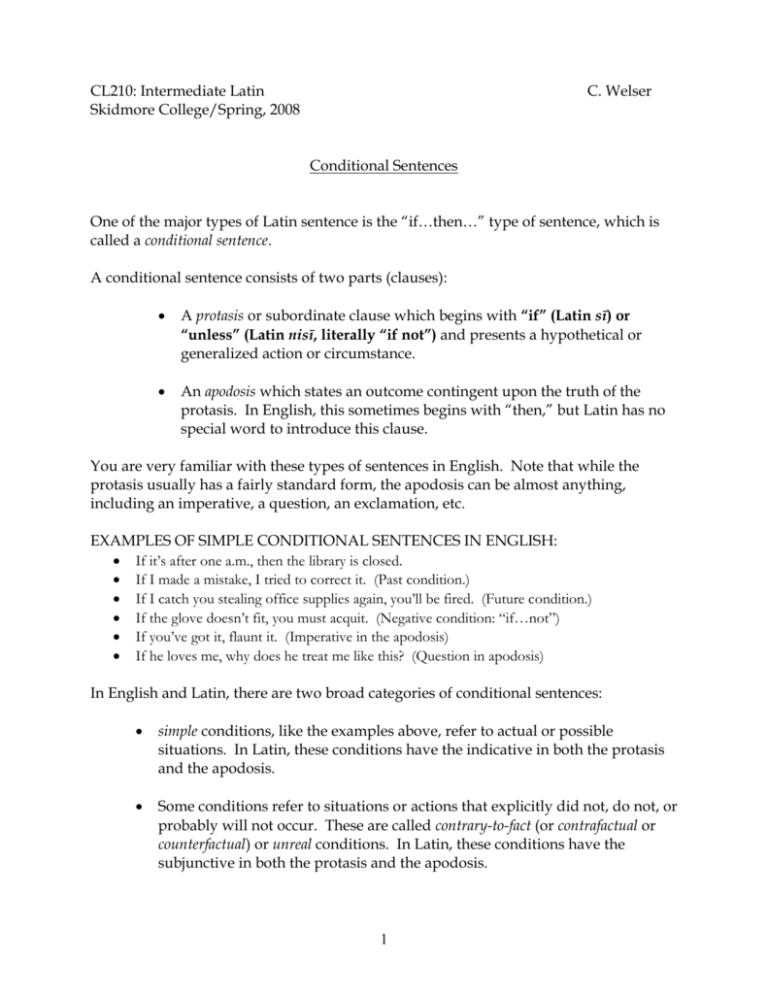
CL210: Intermediate Latin Skidmore College/Spring, 2008 C. Welser Conditional Sentences One of the major types of Latin sentence is the “if…then…” type of sentence, which is called a conditional sentence. A conditional sentence consists of two parts (clauses): A protasis or subordinate clause which begins with “if” (Latin sī) or “unless” (Latin nisī, literally “if not”) and presents a hypothetical or generalized action or circumstance. An apodosis which states an outcome contingent upon the truth of the protasis. In English, this sometimes begins with “then,” but Latin has no special word to introduce this clause. You are very familiar with these types of sentences in English. Note that while the protasis usually has a fairly standard form, the apodosis can be almost anything, including an imperative, a question, an exclamation, etc. EXAMPLES OF SIMPLE CONDITIONAL SENTENCES IN ENGLISH: If it’s after one a.m., then the library is closed. If I made a mistake, I tried to correct it. (Past condition.) If I catch you stealing office supplies again, you’ll be fired. (Future condition.) If the glove doesn’t fit, you must acquit. (Negative condition: “if…not”) If you’ve got it, flaunt it. (Imperative in the apodosis) If he loves me, why does he treat me like this? (Question in apodosis) In English and Latin, there are two broad categories of conditional sentences: simple conditions, like the examples above, refer to actual or possible situations. In Latin, these conditions have the indicative in both the protasis and the apodosis. Some conditions refer to situations or actions that explicitly did not, do not, or probably will not occur. These are called contrary-to-fact (or contrafactual or counterfactual) or unreal conditions. In Latin, these conditions have the subjunctive in both the protasis and the apodosis. 1 EXAMPLES OF CONTRARY-TO-FACT CONDITIONS: If men were angels, no government would be necessary. (Contrary-to-fact condition.) If I had known it was a scam, I never would have given them my credit card number. (Contrary-to-fact condition in the past.) If you hadn’t killed all those milkmen, you wouldn’t be in this mess. (Negative contrary-tofact condition in the past.) ►Latin conditions not only have the same mood in both the protasis and apodosis (indicative for simple conditions; subjunctive for contrary-to-fact conditions), they also tend to have the same tense in both clauses as well. The following chart shows the tenses and moods used for various types of condition in Latin. The tenses of the subjunctive for contrary-to-fact conditions, are not obvious, and should be memorized. Also somewhat tricky, and therefore indicated on the chart, are the optimal English translations of these conditions. Also, note that the future contrary-to-fact has a special name, the “future less vivid”: Simple Conditions Present PRESENT INDICATIVE Past PERFECT or IMPERFECT INDICATIVE Future (sometimes called “future more vivid”) FUTURE or FUTURE PERFECT INDICATIVE The pluperfect indicative is less common in conditional sentences, but does occur. Latin often uses the future perfect where English uses the simple future. Contrary-to-Fact Conditions Present IMPERFECT SUBJUNCTIVE English translation: were (protasis); would (apodosis) “If I were you, I would see a doctor.” Past PLUPERFECT SUBJUNCTIVE English translation: had (protasis); would have (apodosis) “If I had been there, I would have smacked him.” Future Less Vivid implies that the action or circumstance expressed in the protasis of the condition is seen as particularly unlikely PRESENT SUBJUNCTIVE English translation: should (protasis) would (apodosis) “If you should get a job someday, I would consider dating you.” 2 Wheelock, Ch. 33: S.A. 1-3, 5-9 Note: S.A. #2 contains a genitive of value. In Latin, the genitive is often used to express the price or value of a thing. In this case, you can still translate the genitive as “of” and the sentences will come out fine. In S.A. #8, use “drive” or “push” as the translation for ago. P&R 2-11 In P&R #11, natae = filiae Catullus: Vivamus, mea Lesbia, atque amemus, rumoresque senum severiorum omnes unius aestimemus assis. 3
